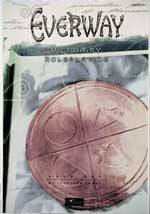I’m starting a new feature here in this blog. In “From the Basement” posts, I’m going to dig up an older game and review it. Today’s game is Everway.
 I have to admit, when it came out, I paid little attention to Everway. Everything I read and heard about it seemed to indicate it was a game slanted at new gamers and with 15 years of game experience under my belt at the time, why would I need a beginner’s game? Plus, with it’s box and cards it seemed … well … kitschy. But when our local game store marked their copies down to $3 apiece, I bought a set … just for the collection, of course.
I have to admit, when it came out, I paid little attention to Everway. Everything I read and heard about it seemed to indicate it was a game slanted at new gamers and with 15 years of game experience under my belt at the time, why would I need a beginner’s game? Plus, with it’s box and cards it seemed … well … kitschy. But when our local game store marked their copies down to $3 apiece, I bought a set … just for the collection, of course.
I don’t remember what prompted our group to try the game, but somehow I ended up volunteering to run a short-term campaign. That was when I fell in love with the game. Everway is great system for groups who want story and character-focused games without a lot of pesky mechanics to get in the way.
Character Creation
Character creation begins with what the game calls “The Vision Stage” — where you come up with a character idea. Before you ever start filling in numbers, you decide who your character is. The game comes with several “vision cards” — fantasy art cards. You chose five of these that appeal to you and write your character around them. Then comes the “questions stage” where you present your five cards and basic character concept to the other players, who then ask you questions about him and the cards you’ve chosen to represent him.
Once you’ve got a basic concept of your character, you move on to the “identity stage”. At this point, you choose a name for your character and decide on a motive — the character’s reason for adventuring. After that, you chose three cards from the Fortune Deck — a deck of cards with a similar feel to tarot or other divination decks — describing your character’s virtue (a special talent, gift, or beneficial trait), fault (a weakness of flaw), and fate (an inner conflict your character has that will shape his destiny).
Only now in the creation process do you start figure numbers for your character. Each character has four stats corresponding the four classical elements: earth, air, fire, water. Earth covers health, strength, endurance — a character’s physical traits. Air covers intelligence, wisdom, communication — a character’s mental abilities. Fire covers action, combat skills, speed. Water covers feeling, intuition, empathy. Stats are done with a simple point-buy system and each character gets one free special ability and you can spend more points to gain further powers, like the ability to use magic. The numbers stage of character creation tends to go very quickly, since players have already developed their character concept before even reaching this stage of creation.
I found this method of character creation very enjoyable. Frequently I tend to play the same type of character over and over no matter the game system or genre. But this method caused me to come up with a character I loved that was very different from my norm.
Mechanics
To say Everway is rules-light would be an understatement. The basic game mechanics are simple — you tell the GM what you want to do and the GM tells you what happens as a result. It’s a completely diceless system, in the tradition of Amber Diceless. If a GM is uncertain what the outcome of a character’s action should be, she can draw a card from the Fortune Deck and use it’s image or meaning (the game comes with a booklet describing the meaning of each of the Fortune Cards) to inspire her. The character’s stats are used as a rough guide to ability — if a character has a high Fire score, they’re much more likely to win a combat against a character with a low one, for example.
Overall Impressions
I enjoy this game very much. I found the visual input from both the vision cards and and the Fortune Deck helped me immensely when describing both setting and PC actions and outcomes. But it is very GM-dependent and requires a GM who’s comfortable running “off-the-cuff”. The players, too, need be flexible and willing to place the coutcome of their actions solely in the hands of the GM.
If you prefer a more structured gaming style, Everway is definitely not for you. Gamers who like “crunchy” systems will likely find this game a exercise in frustration and the lack of randomized outcome generation does eliminate luck as a factor. Generally, you’re not going to have the incredible successes and wild botches tha gaming stories are made of.
I’ve run Everway games for beginning as well as experienced players and it does make a good introduction to roleplaying game concepts. I wouldn’t recommend it for beginning GMs, however. Still, if you’re looking for a change in fantasy game, Everway could be just what you’re looking for.





